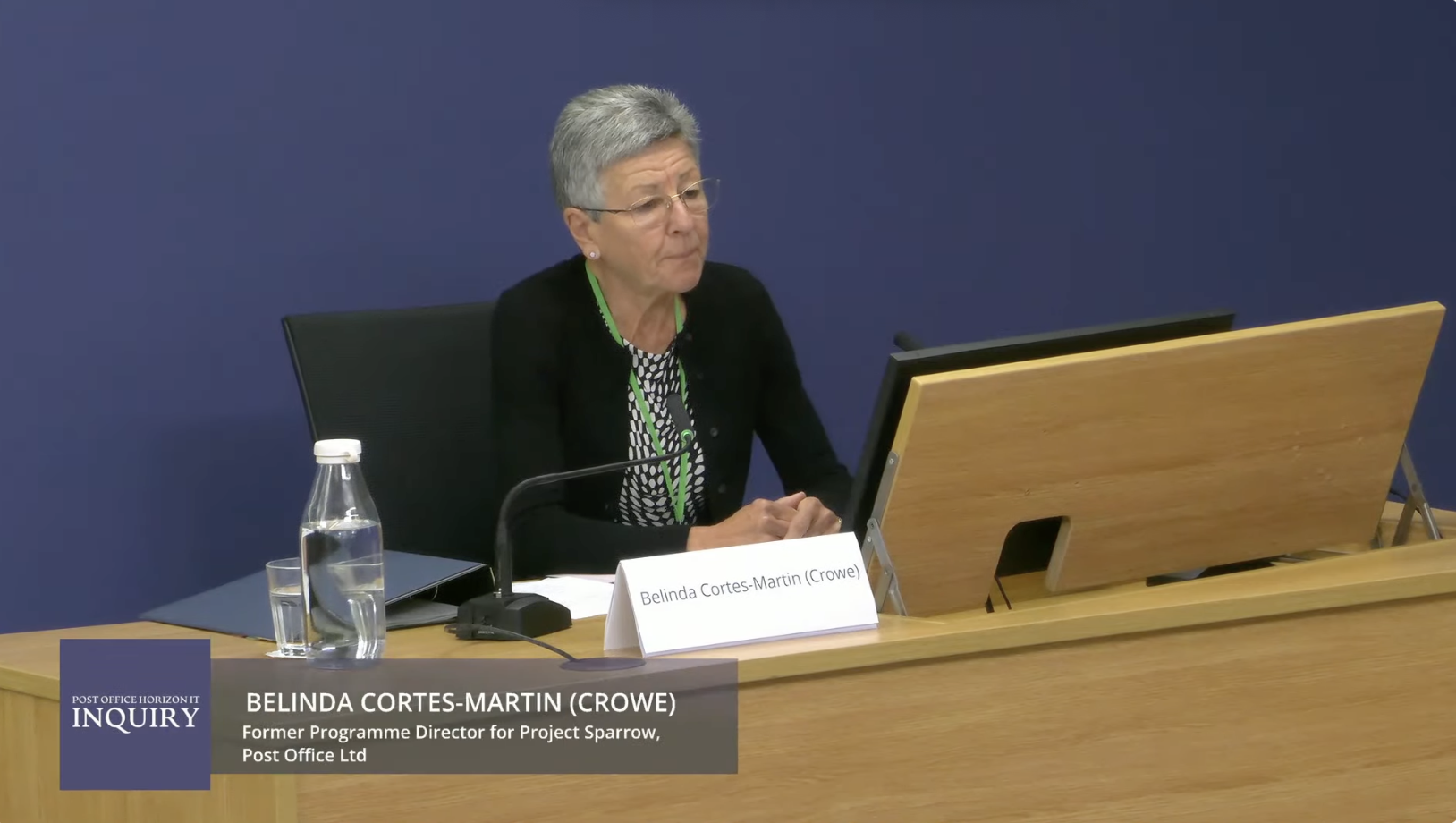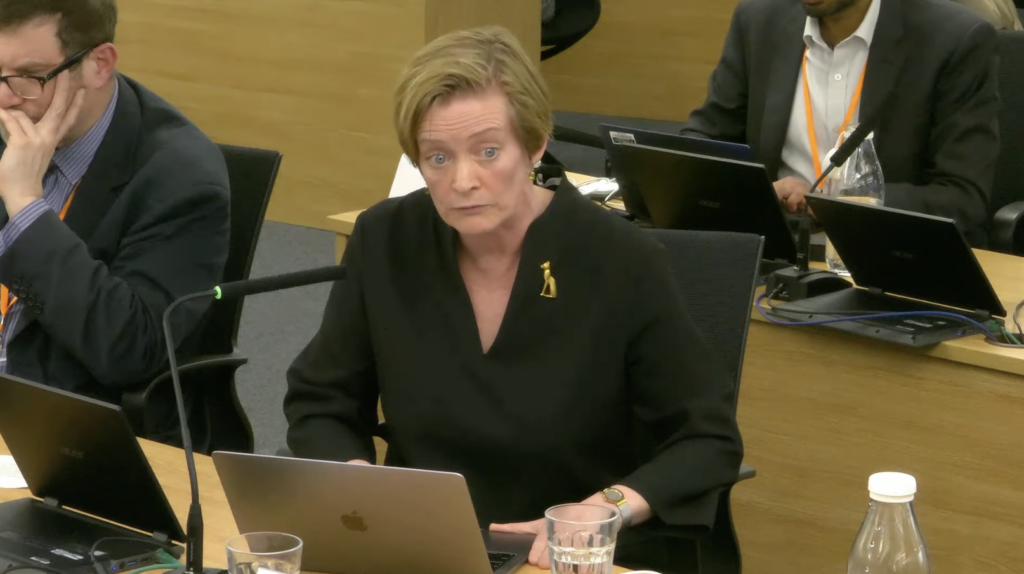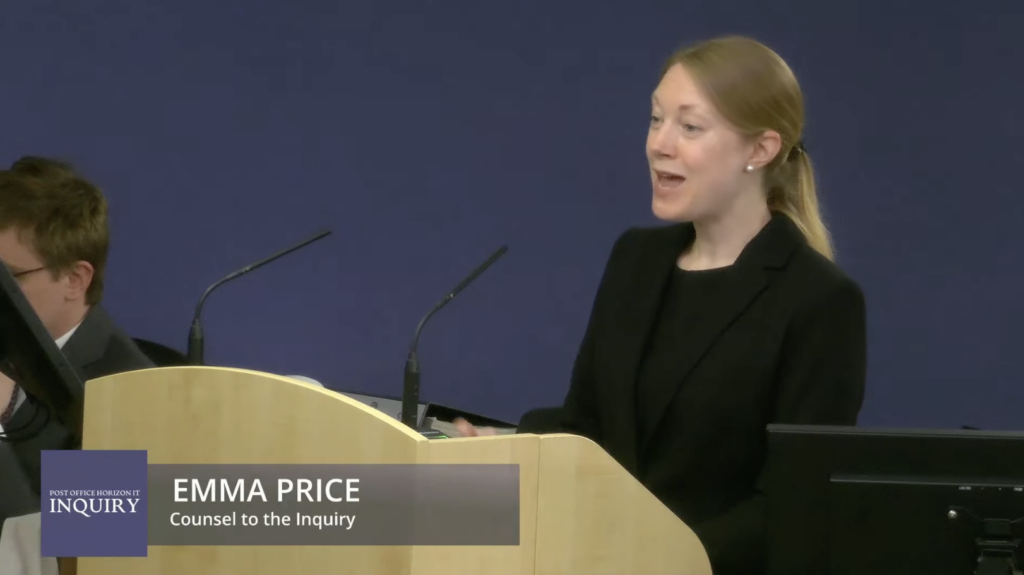
Belinda Cortes-Martin had a dual role. Whilst she was supposedly heading up the Post Office’s Complaint and Mediation Scheme’s Working Group secretariat, supporting and answering to the Working Group’s independent Chair, Sir Anthony Hooper (a retired Court of Appeal judge), Cortes-Martin was also Programme Director for Project Sparrow, the top secret Post Office body set up to control the Complaint and Mediation Scheme (CMS), run by the Post Office CEO, Paula Vennells.
If you think I’m over-egging how secret Project Sparrow was, during the High Court litigation in 2018, the Post Office tried to claim the very word Sparrow was legally privileged and couldn’t be used in court, a concept Mr Justice Fraser said he was “struggling with”, despite letting it go. I am not sure even Second Sight or the Working Group knew of Project Sparrow’s existence. Cortes-Martin did, though.
It seems that whilst the Working Group may have thought of Cortes-Martin as, at most, a neutral party, she was, in fact a conduit of information from the Working Group (WG) back to the Project Sparrow gang (Bond Dickinson’s Andy Parsons, Vennells, Chris Aujard, Rodric Williams, Mark Davies and Angela van den Bogerd).
No authority
Today, BCM painted herself as someone with little or no authority. She didn’t read crucial documents, or when she did, she didn’t read them in a way which caused alarm bells to go off. Some documents she wrote meant something very different from the way they could be read. When caught on the hook she defaulted to claiming she was answering in the abstract [?] before delivering some fluent civil service guff which didn’t so much come across like a post-rationalisation exercise in justifying some dodgy-looking emails, but an active attempt to persuade the inquiry her emails were noble attempts to do the right thing when read from a possibly invented premise.
If you want to read the live tweets, collated with screenshots of a raft of documents, click here.
In many ways Cortes-Martin was one of the most dangerous witnesses because she was clearly very bright and very careful, a career civil servant from 1979 to 2011, eventually leaving as Information Director at the Ministry of Justice.

Although she seemed extremely reluctant to admit it, Cortes-Martin was working to remove Second Sight’s grip of the investigation from pretty much the moment she came on board. Barrister Flora Page took BCM to an email she wrote to Angela van den Bogerd on 22 October 2013, very shortly after Cortes-Martin began working on the CMS. In it she says:
“I said I would do a note about how to move to a place where Second Sight are able to leave the WG and allow Post Office to take over sole responsibility for [Horizon/Subpostmaster] investigations.”
Page notes she failed to mention this in her Witness Statement. “Did you forget about it?” she asked.
“I definitely didn’t recall it” replied Cortes-Martin.
On 9 April 2014, Andy Parsons from (later Womble) Bond Dickinson sent Cortes-Martin the first Clarke Advice. Barrister Emma Price asked her if she read it. Cortes-Martin told her:
“I have to assume I didn’t read it… The reason I don’t believe I saw this is that I did continue to insert into briefing comments about Post Office’s confidence in the safety of its prosecutions and I can’t imagine I would have done so, having read this.”
Cortes-Martin told Price that if she did see it, she would ask questions of Jarnail Singh, Andy Parsons and Chris Aujard. The Inquiry chair, Sir Wyn Williams wanted to know why she wouldn’t have told the Sir Anthony Hooper, a retired Court of Appeal Criminal Division judge, who she reported to on the Working Group. Cortes-Martin replied:

“All of the issues that arose in relation to Horizon or indeed prosecutions had a much wider application than just those cases in the scheme, so I think I would have wanted to understand the situation before I did anything wider. If I might take your point slightly further… if I had read this and asked questions and about it and was not satisfied with the response that I got, then I think Sir Anthony Hooper, as opposed to going to the WG is the person I would have discussed this with.”
Thankfully, Cortes-Martin didn’t read the Clarke Advice, so what she might have done was academic. Phew.
Following on from Cortes-Martin’s role in quietly trying to shepherd Second Sight out of the Post Office whilst supplying the Working Group on which Second Sight sat, we were shown an internal response to an email written in Jan 2014 by Cortes-Martin in which she said in CAPS:
“WE NEED TO CONSIDER CAREFULLY WHAT AND HOW WE SEEK TO FETTER [Second Sight]. SAH HAS MADE IT CLEAR THAT SS CAN INCLUDE WHAT IT WANTS SO WE NEED TO TREAD CAREFULLY.”
Price wanted to know what Cortes-Martin meant by a desire to “fetter” Second Sight and the need to “consider carefully”. Cortes-Martin said:
“one doesn’t necessarily expect that some ten years later you’re going to be asking questions about it, so I acknowledge in this and other emails I have not chosen my words as I might have done, had I known this.”
Which appears to be acknowledging that if she thought anyone external would read her words, she would have tried to hide her true intentions. Then she came up with a piece of sophistry:
“What I’m saying here is there must be something that Second Sight has objected to that makes it look as if the Post Office is trying to fetter it and what I’m saying is, we need to think carefully about the extent to which we do that and actually it’s nothing more than that. So – don’t try to fetter Second Sight in a way that’s not appropriate, particularly in the light of what Sir Anthony Hooper said.”
Hmm. Judge for yourself.

Not satisfactory
Cortes-Martin was shown an email sent to her by Andy Parsons about the Helen Rose (HR) report which notes a clear issue with Horizon where it ascribes activities on the audit database to Subpostmasters when they are, in fact, generated by the system. Parsons says:
“our preferred approach is to try to down play the importance of the HR report in any POL [Post Office Ltd] Investigation Reports [for the CMS]. We recommend minimalising or ignoring entirely the HR Report when responding to CQRs [Case Review Questionnaires – applications to the scheme]”
Cortes-Martin did nothing about this, instead saying it was “a matter of regret, among many, if I may say so” that Parsons’ advice was “not satisfactory”. Cortes-Martin contended that if the HR report was “not important” that should have been “clearly stated” to an applicant. “I wish”, she said, “and indeed, on reflection, I should have challenged that.”
And this was the closest Cortes-Martin got to an admission of fault. When she was asked by Price what else she regretted, she replied:
“I regret not digging down deeper into some of the issues which clearly passed my desk. Had I done so, I might have asked more questions. I can’t guarantee, because this whole issue continued well after I left, that it would have made any difference. But it’s quite… looking at documents this far after the event, I’ve looked at a few and thought I could have done something differently with that… and I would say regretting being involved with it in any way at all is my biggest regret.”
I suspect she manages to sleep easily enough.
I am currently touring Post Office Scandal – the Inside Story until Thu 16 May 2024. There are six more dates remaining in Devon, Dorset, Somerset, Wiltshire, Surrey and Essex. You can find the specific venues and timings here. All look likely to sell out except Swindon (Mon 13 May) which, for some reason is doing quite badly. If you can make it to the Wyvern Theatre in Swindon, I’d love to see you.
The journalism on this blog is crowdfunded. If you would like to join the “secret email” newsletter, please consider making a one-off donation. The money is used to keep the contents of this website free. You will receive irregular, but informative email updates about the Post Office Horizon IT scandal.

Leave a Reply